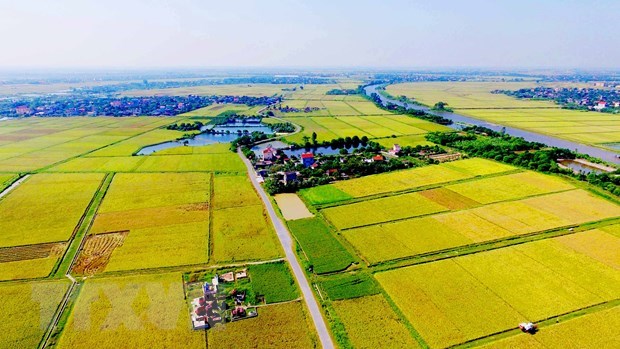Policies needed to boost agricultural land market
A failure to improve the agricultural land market has discouraged the private sector to invest in the sector, experts have said.
 Illustrative image (Photo: VNA)
Illustrative image (Photo: VNA) Hanoi (VNA) - A
failure to improve the agricultural land market
has discouraged the private sector to invest in the sector,
experts have said.
Vice Director of the Institute for Policy and Strategy of Agricultural and Rural Development (IPSARD) Hoang Vu Quang said the prevailing problem with the country’s agriculture sector was that farmers often owned small land lots instead of large-scale fields.
Speaking at a workshop on measures to develop the agricultural land market last week in Hanoi, Quang said 26 percent of Vietnamese farmers had less than 2ha of arable land, of which 63 percent owned less than 0.5ha.
The Government had recently attempted to adjust its land policy towards allowing large-scale land accumulation to help create concentrated production areas and attract the private sector to invest in agriculture, he said, but things “did not work out as expected”.
“We can only increase our competitiveness once we address the land accumulation puzzle,” Quang said.
But according to Nguyen Van Ton from the Department of Agriculture – Rural Affairs under the Party Central Committee’s Economic Commission, Vietnam’s farmland market was still young and lacked much-needed transparency to attract investors.
“Some administrative regulations are not in favour of promoting the agricultural land market,” he said.
Dau An Tuan, Director of the Department of Legal Affairs under the Vietnam Chamber of Commerce and Industry (VCCI), told the workshop that up to 31 percent of agricultural businesses in a survey said that paperwork was the biggest challenge for them.
Nguyen Trung Kien from IPSARD said that the Government could consider learning lessons from Japan and China to develop the farmland market.
Japan, for example, set up the Farmland Intermediary Administration Organisation (FIAO) in 2014. It mainly acts as a middle-man, renting land from farmers and redistricting small farms to form larger plots and lend to the large-scale farms and enterprises.
“The Government’s role in that organisation is crucial. The Japanese government supports the FIAO by a range of policies like levying a high tax on abandoned land, revoking unclaimed lots and offering financial aid for commercial farms and firms to rent the land,” he said.
China, meanwhile, established the first Land Transfer Service Centre (LTSC) in 2010 to acquire land and provide information on the demand and supply of the rental land market, Kien said. The Chinese government guarantees preferential loans for big farms and businesses to rent land or to build irrigation infrastructure and other facilities.
Meanwhile, Quang from IPSARD suggested the government should create a smooth legal corridor for the agricultural land market and have support policies in terms of credit or labour. It should build an effective and transparent land management system, he added./.
Vice Director of the Institute for Policy and Strategy of Agricultural and Rural Development (IPSARD) Hoang Vu Quang said the prevailing problem with the country’s agriculture sector was that farmers often owned small land lots instead of large-scale fields.
Speaking at a workshop on measures to develop the agricultural land market last week in Hanoi, Quang said 26 percent of Vietnamese farmers had less than 2ha of arable land, of which 63 percent owned less than 0.5ha.
The Government had recently attempted to adjust its land policy towards allowing large-scale land accumulation to help create concentrated production areas and attract the private sector to invest in agriculture, he said, but things “did not work out as expected”.
“We can only increase our competitiveness once we address the land accumulation puzzle,” Quang said.
But according to Nguyen Van Ton from the Department of Agriculture – Rural Affairs under the Party Central Committee’s Economic Commission, Vietnam’s farmland market was still young and lacked much-needed transparency to attract investors.
“Some administrative regulations are not in favour of promoting the agricultural land market,” he said.
Dau An Tuan, Director of the Department of Legal Affairs under the Vietnam Chamber of Commerce and Industry (VCCI), told the workshop that up to 31 percent of agricultural businesses in a survey said that paperwork was the biggest challenge for them.
Nguyen Trung Kien from IPSARD said that the Government could consider learning lessons from Japan and China to develop the farmland market.
Japan, for example, set up the Farmland Intermediary Administration Organisation (FIAO) in 2014. It mainly acts as a middle-man, renting land from farmers and redistricting small farms to form larger plots and lend to the large-scale farms and enterprises.
“The Government’s role in that organisation is crucial. The Japanese government supports the FIAO by a range of policies like levying a high tax on abandoned land, revoking unclaimed lots and offering financial aid for commercial farms and firms to rent the land,” he said.
China, meanwhile, established the first Land Transfer Service Centre (LTSC) in 2010 to acquire land and provide information on the demand and supply of the rental land market, Kien said. The Chinese government guarantees preferential loans for big farms and businesses to rent land or to build irrigation infrastructure and other facilities.
Meanwhile, Quang from IPSARD suggested the government should create a smooth legal corridor for the agricultural land market and have support policies in terms of credit or labour. It should build an effective and transparent land management system, he added./.













